#but also: read above
Text

… a part of me can’t help but think that maybe, just maybe, this is jason’s way of reaching out, that jason is floundering after the events of utrh and yet finding out about blockbuster (that dick “helped” to kill him) means that maybe jason would find some acceptance in dick, that he would have someone from the family on his side. it’s just too bad that jason reached out like this in the worst way possible (wearing dick’s suit as nightwing and killing people with it) and speaking about what is probably one of the worst experiences of dick’s life… [nightwing v2 #119]
#jason todd#dick grayson#this arc holds one of the funniest jason todd moments i will never let him live down#(tentacle monster jason todd is in this arc)#but also has a pretty heartwarming letter that jason sends to dick :(#admittedly dick doesn't... have the nicest thoughts of jason at times during this arc...#but also: read above
226 notes
·
View notes
Text

Is this anything
#always an awkward conversation to have irl#“i love ai.” insert that one spongebob holding out his hands with a shadow above him meme#“FICTIONAL. FICTIONAL AI!!!”#clankerposting#Clay posts#fictional ai#shitpost#hal 9000#robots#p03#electric dreams#allied mastercomputer#ihnmaims#shockwave#transformers#fuck ai#this is an anti ai art blog btw#objectum#saying hello to everyone who reads the tags um... hi!! Really funny to read people recommending me entry level robot/AI media#like yes i have indeed heard of portal and ultrakill. i just didnt pit them in the meme </3#also some guy decided to write in the notes that they were going to crush me into red paste. hot? thank you? ???? weird.
23K notes
·
View notes
Text

Its my bestie @cc-kote's bday today!! So i did a little codywan for him, as a treat (he also has a kick ass fanfic about them check it out)
#the fanfic takes place in the future on tatooine ben era#so its different from the above pic XD but its also very wholesome#obi wan kenobi#commander cody#star wars#clone wars#codywan#my art#READ MY FRIENDS FANFIC#U WONT REGRET HES A WORDSMITH
3K notes
·
View notes
Text
“Anakin/Vader has 6 movies, a long running cartoon series and a zillion comics and books about him why do you want a live action series starring him?”
Because Hayden Christensen has an outstanding face and is hot as fuck with a lightsaber hope this clears things up!

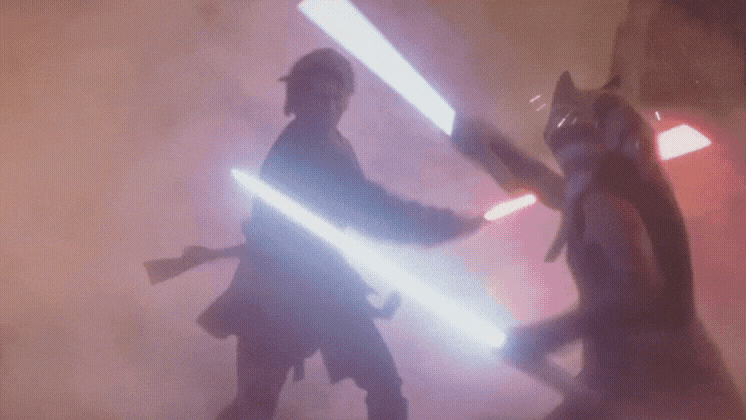
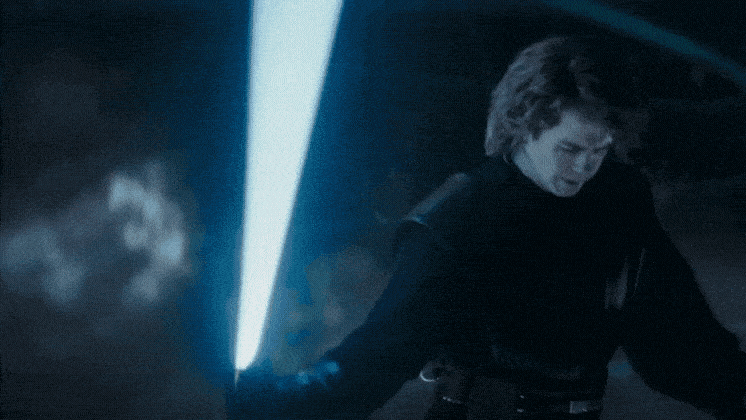
#‘why don’t you just watch The Clone Wars?’ Because it doesn’t have Hayden’s face this isn’t complicated#‘why don’t you just read the Vader comics?’ see above#I keep seeing this take on Twitter#it has nothing to do with the quality of the cartoons or comic (which are overall good!)#and everything to do with me wanting to look at Hayden#also I really do think if done right a Vader series would be killer#hayden christensen#anakin skywalker#ahsoka series#give hayden a Vader series
1K notes
·
View notes
Text
I understand that literature nerd Jason Todd is kind of overblown in fanon compared to it's actual presence in canon (a few issues during his pre (and post?)crisis Robin tenure that highlight it) BUT consider that I think it's hilarious if the unhinged gun toting criminal has strong opinions on poetry
#ramblings of a lunatic#dc comics#Jason Todd#batfamily#it's just a fun quirk! it's a fun lil detail and I simply cannot slight ppl for enjoying and incorporating it into works#like obviously jason isn't the only one. I'm a big believer in the batfam having over lapping interests they refuse to bond over#i know dick canonically used the robin hood stories (which are pretty flowery in their language far as i can tell) as inspo for Robin#and i know babs was a librarian and even tho her area of nerddom is characterized as more computery she probably knows quite a lot-#-about literature as well#duke is a hobbyist writer i believe? i saw a fan mention that- which if so is great and I hope he's also a nerd#(i mean he is canonically. i remember him being a puzzle nerd in his introduction. but i mean specifically a lit nerd)#damian called Shakespeare boring but also took acting classes so i think he's more of a theatre kid.#Tim's a dropout and i don't think he's ever shown distinct interest in english lit and i can't remember for Steph?#I'm ngl my brain hyperfocused on musician Steph i forget some of her other interests I'm sorry (minus softball and gymnastics!)#and then Cass had her whole (non linear but it's whatevs) arc about literacy and learning to read#went from struggling to read in batgirl 00 to memorizing Shakespeare in 'tec and is now an avid read in batgirls!#she's shown reading edgar allen poe but we don't know if it's his short stories or his poems#point to all of the above being: i know Jason's not the only lit nerd in the batfam#but also i do need him to be writing poetry in his spare time and reading and reviewing it#jason at the next dead robins society meeting: evening folks today I'll be assigning all of us poems based on laika the space dog#damian and steph who have been kidnapped and brought to jasons warehouse to hangout: LET US GO BITCH#speaking of^ random poem i think jason would like: space dog by alan shapiro#wake up one morning in an unfamiliar more mature body with a profound sense of abandonment. the last four lines. mmm tasty
515 notes
·
View notes
Text
dudebros have orv wrong, it's not a solo leveling rival, it is a solo leveling lover! orv loves solo leveling, it loves level up with the gods, it loves regressor's instruction manual, it loves i'm the max level newbie!! it loves greek myths and korean history and psychology papers and chinese legends and ancient literature as much as it loves repetitive regression isekai cashgrabs!!! it loves the best AND the worst stories the world has to offer!!! it loves all the stupid trashy stories that are worth less than the bug under the soles of your shoes because even shitty stories can have meaning when it has a reader that loves it despite or even because of all its annoying shitty overused cliché repetitive tropes!! it owes its existence to those stories!!! that's the essence of orv, all stories are meant to be loved, if not by you then by someone!!!!
#orv#the only thing it hates are plagiarism and illegal readers and sssss-grade infinite regressor which technically falls under plagiarism#but also not really please read orv chapter 500 above to understand
252 notes
·
View notes
Text
wei wuxian vs. pragmatism: what MDZS intends to say about righteousness
copy/pasting most of my rather bitchy reply into its own individual post because i think it deserves to stand on its own.
so i think we can all agree that MXTX intends for us to read MDZS and conclude that wei wuxian is ultimately a deeply heroic and righteous person. whether you as the reader agree with this assessment of wei wuxian's moral character is another question entirely, but at the very least it is fairly obvious to all of us that MXTX intends for us to read him as a good person.
so why does MXTX call wei wuxian a good person? what aspects of his character and which of his choices make him a good person? what moral framework and what definition of morality does MXTX employ in order to call wei wuxian a good person?
i posit that MXTX argues that wei wuxian is heroic precisely because he is not pragmatic - because he adheres to his moral ideals despite the consequences, and because he did not make moral sacrifices at critical junctures of his life. the first half of this post will argue that wei wuxian is not pragmatic. the second half of this post will argue that this is exactly why wei wuxian is heroic, and that the moral framework employed by MXTX is deeply idealistic instead.
so let's begin.
let's start by establishing two things.
first: what MXTX argues about morality through the narrative of MDZS and the reader's own beliefs about morality are two different things. me saying "MDZS argues that xyz is righteousness" and me saying "i think xyz is righteousness" are two different statements. the following analysis is concerned not with what i myself consider to be righteous, but rather what MXTX argues through MDZS is righteous.
second: wei wuxian is not pragmatic.
what does it mean to be pragmatic? unless we are speaking about the school of philosophy specifically (which i am not here), being pragmatic means being grounded in reality and focused on practical outcomes. it means being result-oriented and considering the consequences of your actions before you act; it means acting only after you have considered the potential consequences of all possible courses of action and have then decided which outcomes are acceptable. being pragmatic also means recognizing when achieving everything you want is impossible. and, in such situations, being pragmatic thus entails compromising to achieve a desired outcome, even if that means you don’t get everything they want. to put it in edgier terms, being pragmatic means being able to make moral sacrifices.
an idealistic person attempts the impossible. a pragmatic person recognizes when something truly is impossible.
wei wuxian is not pragmatic.
first, wei wuxian is not someone who carefully considers the consequences of his actions before he acts. in fact, he displays a startling lack of consideration for consequences. it repeatedly falls upon other characters to either try (and fail) to hold him back.
when wei wuxian punched jin zixuan for insulting first jiang yanli and then jiang cheng, did he consider that jiang fengmian and jin guangshan might then dissolve the betrothal, and that jiang yanli might have wanted to make a decision regarding that on her own? no. he just punched jin zixuan because he was mad that jin zixuan had insulted two people he loved.
when wen chao threatened mianmian, and lan wangji and jin zixuan stood up for mianmian, and then wei wuxian stood up for them by holding wen chao hostage in turn - did he consider that there might be consequences for humiliating and threatening the life of the son of a warmongering great sect leader who has already proven capable of attacking other sects? no. did he stop and think "alright, wen ruohan has already attacked the cloud recesses, which proves that he's willing to wage war against the other sects. threatening the son of a sect leader is an easy way to earn any sect leader's ire, and since i'm the first disciple of the jiang sect, this puts not just me but the entire jiang sect on wen ruohan's shitlist"? no. it would be one thing if wei wuxian weighed this possibility and then decided that rescuing an innocent girl and the people who defended her was more important was worth the risk - that would show that he considered the consequences and then made his choice. but the thought simply never entered his mind. he acted simply because he wanted to save mianmian, jin zixuan, and lan wangji from the wens; he did not think beyond that.
when wei wuxian busted the wen remnants out of the qiongqi pass labor camp, did he have a clear plan as to how he was going to weather the political fallout? did he have a plan more detailed than "live quietly in the burial mounds until everyone forgets about us"? no. when jiang cheng challenged him as to how he was going to survive the situation, he did not in fact offer anything more concrete than "we'll just wait for everyone else to forget about us." he blustered about being a once-in-a-generation genius who could accomplish the impossible, but he provided no actual plan as to how he was going to do it. this leads me to conclude that wei wuxian did not in fact have a long-term plan for handling the consequences when he went ham at the qiongqi pass camp - that, instead of weighing the consequences and then making his decision, he instead decided immediately that this was something he had to do, consequences be damned.
and then - on top of this - all of his following actions then point in the exact opposite direction of his stated plan of waiting for everyone to forget about them. because instead of doing anything to fade into the background, everything wei wuxian did instead just convinced the jianghu he was an intolerable threat.
and this was not a sustainable strategy.
one thing i really appreciate about MXTX is that she does not make the rest of the jianghu into one-dimensional villainous morons. it's quite easy for lazy writers who want a persecution plotline to have the rest of the story's society magically start hating on the protagonist for no good reason, to make every background character in the story's world a three-braincell moron. but MXTX is not that author. it speaks to MXTX's skill as an author that, from the perspective of the rest of the jianghu, fearing wei wuxian as a mortal threat was an entirely reasonable conclusion for them to come to.
first, the gentry's most recent direct interaction with wei wuxian during this time period is him threatening to kill all of them. when jin zixun doesn't give him the information he wants, wei wuxian straight up says: "if i want to kill everyone here, who can stop me? who dares stop me?" this is a threat! and - surprise - threatening to kill people naturally makes people think that you want to kill them!
next, wei wuxian refined wen ning's dead body into the first sentient fierce corpse in history, and also the strongest fierce corpse in living memory - and then took wen ning with him on night-hunts. that's where the reputation of "the yiling patriarch and his ghost general" comes from. this very naturally made the rest of society fear him even more, because now the guy who has just recently threatened to kill you has demonstrated even more of the power to easily do so! the unparalleled power to do so, which no one else possesses and it would be very hard for anyone else to counter! add in the fact that wei wuxian's activities were also attracting prospective disciples - people gathering outside the burial mounds because they wanted to learn demonic cultivation - and naturally the public is even more frightened, because now it looks like the guy who threatened to kill all of you is also gathering the political force to do so!
the public is incorrect about wei wuxian's intentions, of course. but what does wei wuxian do to correct these misconceptions? to rehabilitate his public image, because now his public image has the life of not just himself but also all the wen remnants under his protection riding on it? to prove to the public that he isn't an active threat to their lives - that he does not seek to murder them all in their beds - that it is safe for them to allow him to live, and that they can in fact survive if they don't kill him?
nothing.
it would be one thing if the story mentioned how wei wuxian tried to correct the malicious rumors about himself and failed. but that is not what happened. what happened is that wei wuxian sat on his corpse mountain and let everyone else say what they wanted to say. and when he left his corpse mountain, it was to bring his one-of-a-kind unparalleled sentient fierce corpse with him on night-hunts, which of course just fanned the flames of the rumors instead. he doesn't even tell the prospective pupils camped on his front door to fuck off - he just sneaks in through the back door.
this is not pragmatic behavior. though you can argue that wei wuxian's strategy here was to become so powerful and so scary that no one would dare try to fight him, anyone with a brain can tell you that this is not a sustainable solution in the long-term. first, if you want to use threats to keep someone from attacking you, you also need to promise stability - you need to give people the reassurance that if they don't start shit with you, then you'll leave them alone too. if you drive the "threat" factor too high, as wei wuxian did, you instead end up convincing people that if they do nothing you'll kill them anyways - that they have no choice but to kill you if they want to survive.
second, if you want to use threats to keep someone from attacking you, you also need to prepare for the inevitability that, if someone does end up getting hurt, everyone will blame you first and no one will want to hear your side of the story. after all, if someone gets hurt, then the first suspect everyone looks towards will be the guy who's been consistently saying "i'm strong enough to hurt you! i'm strong enough to hurt you! don't start shit with me because i'm strong enough to end you!" for the past few months. this is basic common sense. and yes, the society of MDZS is unfair - wei wuxian deserved a proper trial and investigation after the death of jin zixuan. but the fact that society is unfair is something a pragmatic person would have recognized and planned for.
wei wuxian did not recognize and plan for this reality. even after he accidentally kills jin zixuan, wei wuxian still insists that if only the jianghu investigates jin zixun's hundred holes curse, they'll see that wei wuxian didn't cast the hundred holes curse, they'll see that there was more scheming going on, etc etc. wen qing has to directly spell out for him that, at this point, society no longer cares about the truth of the matter. it seems that wei wuxian was actually oddly idealistic about the true nature of his society all the way until the very end.
all of this leads me to conclude that, when wei wuxian busted the wen remnants out of the qiongqi pass labor camp, he did so without considering the consequences of his actions. he assumed that he could improvise and weasel his way out of this situation, as he's always done in the past with his typical genius - only this time, he was wrong.
wei wuxian acts without considering the consequences of his actions. he does not make a decision only after carefully deliberating over all of the potential outcomes - not at all. instead, he acts in the moment - not out of any rational consideration of potential outcomes, but rather because it is simply something he must do. this by definition makes him a deeply unpragmatic person.
to put it into more familiar terms, for wei wuxian, the righteousness of an action comes not from its consequences, but are rather inherent to the action itself. even if he were doomed to fail, he could not give up on the wen remnants.
second, at critical junctures, wei wuxian is unable to make moral sacrifices. to be pragmatic is to know when you have to sacrifice: to know when, in order to achieve the most inalienable of your goals, you have to give up on some of your other goals. this is something wei wuxian is consistently unable to do.
of course, when it comes to his own wellbeing, wei wuxian is all too willing to sacrifice. he'll carve out any number of his internal organs to save those he loves. but this honestly speaks less to wei wuxian's moral framework and more to his lack of self-worth from a troubled upbringing.
because, when it comes to any moral cause, wei wuxian is entirely unable to sacrifice anything, even if being unable to sacrifice entails more negative consequences. wei wuxian could not sacrifice mianmian, jin zixuan, and lan wangji to wen chao and his goons, so he took action and took wen chao hostage himself. to sit back and do nothing as wen chao threatened the lives of those three was simply unthinkable for him - even if it meant taking a course of action that put yunmeng jiang in danger.
wei wuxian's relationship with jiang cheng deteriorated because jiang cheng did not know about the golden core transfer: because jiang cheng did not know that wei wuxian could no longer cultivate, from jiang cheng's point of view, it looked like wei wuxian was just refusing to help out and fulfill his promises for kicks. wei wuxian could have made things a lot easier for himself and also any wen remnants he chose to rescue had he simply told jiang cheng the truth - but he knew that finding out the truth of the golden core transfer would make jiang cheng miserable, and [jiang cheng's happiness] was not something he was willing to sacrifice.
wei wuxian's single most prominent moral decision is his refusal to allow the wen remnants to be sacrificed. anyone with a shred of political sense had to know that rescuing the wen remnants and then protecting them would be near impossible - that it entails making an enemy of the jin, and due to the jins' power, the entire jianghu. wei wuxian himself knew this; he is no moron. wei wuxian also had no long-term plan, no allies, and significantly less power than the rest of the world believed. yet, despite this all, he acted anyways, because he could not let the wen remnants be sacrificed.
the wen remnants wei wuxian rescued from the qiongqi pass labor camp included both regular civilians and cultivators. perhaps wei wuxian could have negotiated a proper release for the non-cultivating civilians, such as granny wen and a-yuan, had he chosen to give up on the cultivators. but - the question of whether this would have worked or not aside - this was not a sacrifice wei wuxian would be willing to make.
nor could wei wuxian sacrifice the safety of yunmeng jiang. i am firmly of the belief that, had yunmeng jiang formally stood by wei wuxian's side after wei wuxian attacked the jin-run labor camp, lanling jin would have eventually declared war on yunmeng jiang, and yunmeng jiang's would inevitably be destroyed. both wei wuxian and jiang cheng understood this as well - which is why wei wuxian told jiang cheng to let him go.
(you can argue - successfully - that wei wuxian did in fact sacrifice [his obligations to yunmeng jiang and his promise to jiang cheng] by leaving yunmeng jiang to protect the wen remnants. this is true. but i think that - from wei wuxian's point of view - this was not much of a sacrifice, because due to wei wuxian lacking a golden core, he already viewed himself as mostly useless to yunmeng jiang. so him leaving - in his view - is not really that much of a loss for yunmeng jiang.)
wei wuxian promised wen qing that he would return wen ning's consciousness to his corpse. when wei wuxian made this promise, he had no idea if he could actually pull it off or not. but then he did - and, in the process, created the most dangerous weapon the jianghu had seen in living memory. wen ning specifically, or moreso wei wuxian's inability to control him, leads to so much of wei wuxian's eventual downfall: wei wuxian loses control of wen ning and accidentally kills jin zixuan; when wen ning goes to turn himself in at jinlintai, he ends up going berserk again and killing another 10-20 jin and lan cultivators, which leads to the nightless city pledge conference. frankly, wei wuxian could have avoided a lot of trouble - or at the very least, a lot of the public's fear - had he not raised wen ning from the dead. it's not like he'd be completely defenseless without wen ning, either. but wei wuxian promised wen qing he would resurrect wen ning - and he could not sacrifice his promise to wen qing because of what wen qing had already done for him.
a pragmatic person is able to make sacrifices, including moral ones. at the very least, a pragmatic person recognizes when sacrifice is inevitable, when all paths lead to something being lost. a pragmatic person, put in the trolley problem, would recognize that there were only two options and that both options involve sacrifice: either he must kill one person, or he must allow five people to die. there is no path forwards in which all six people live.
wei wuxian is unable to make moral sacrifices. he clings on to all of these moral causes, all of these promises and obligations, and it is precisely because he attempts to hold onto all of them that he ends up losing everything. to reuse the previous example, wei wuxian in the trolley problem tried to save all six people because he could not accept any of the sacrifices made inevitable by the trolley problem.
to put this all together - wei wuxian is not a pragmatic person. he makes decisions with his gut, not his head - he does not consider the consequences of his actions before he acts. nor is wei wuxian able to make sacrifices - even necessary ones in order to avoid greater tragedies.
but. none of this means that wei wuxian is not a deeply heroic person. rather, to do what you believe to be righteous and attempt to live up to your ideals despite the consequences is exactly what MXTX lauds as moral. and to be unable to make a moral sacrifice when everyone else in your society easily does so is in fact deeply heroic.
it is precisely because wei wuxian is not pragmatic that MXTX declares him a hero.
some people, including myself, favor a moral framework that centers pragmatism and reason as virtues. to us, the ideal moral character is someone who makes decisions based on reason and not emotion, who considers the potential consequences of every course of action before making a decision, and who then, based on these inferred future consequences, uses reason to deduce which of all of the possible outcomes is the most preferable.
but this does not in fact describe wei wuxian, nor is this how wei wuxian views ethics. and to be honest, i don't think this is how MXTX views ethics either.
in all three of her stories, MXTX repeatedly comes down harder on the characters who make pragmatic decisions, the characters who are willing to sacrifice. in fact, killing sunshot soldiers while acting as wen ruohan's spy, and then killing nie mingjue's men in order to ensure a chance at killing wen ruohan and saving nie mingjue, was the pragmatic thing for meng yao to do, because that was the least bloody path forwards towards a sunshot victory over qishan wen. in fact, cutting ties with wei wuxian after he attacked the jin-run qiongqi pass labor camp was the pragmatic thing for jiang cheng to do, because it was the only path forward that did not put yunmeng jiang, his first and foremost responsibility, in the line of fire. and yet (though the situation is less clear with jin guangyao), MDZS as a narrative criticizes both jin guangyao and jiang cheng for these decisions - because, to MDZS, righteousness does not lie in pragmatism.
(this is a statement i personally disagree with. but we are here to discuss what MDZS wants to say about pragmatism and righteousness, not what i want to say about pragmatism and righteousness.)
by contrast, the one single act for which deeply controversial jiang cheng is ultimately lauded for in the narrative is also his single least pragmatic, most emotional act. the one single act of jiang cheng's that MDZS does not criticize is when, after the fall of lotus pier, jiang cheng ran out from his hiding spot to distract the wen soldiers from seeing wei wuxian. from a filial, duty-based point of view, this was a deeply stupid and unpragmatic course of action: jiang cheng's first and foremost duty, as the sole surviving jiang and new sect leader jiang, was to survive, rebuild his sect, and avenge his parents. from a consequentialist point of view, this impulsive choice is also what led to the domino-fall of tragedy that followed, since jiang cheng then got captured and had his golden core melted, which then led to everything else. yet this stupid, unpragmatic, and impulsive decision is ultimately the one act MDZS considers to be jiang cheng's single most heroic.
the key as to what MDZS considers to be heroic, what it considers to be righteous, lies in the jiang family motto: 明知不可而为之, attempt the impossible. this line, taken from the analects of confucius, can be considered to be a deeply deontological ideal. i find this twitter thread (warning to my followers: does kind of dunk on JC) to be rather helpful in elucidating this line's meaning.
to attempt the impossible, to try what shouldn't be tried. "ask yourself not whether you can do it, but whether you should...consider not the result but rather the journey - have a clear conscience regardless of outcome." in other words, what matters is less whether you succeeded or failed, or what sort of outcome your actions brought about - what matters is that you tried. what matters is that, in the face of overwhelming odds, you tried to do what you think is right. and even if you end up failing - even if everyone you sought to protect ended up dying - the fact that you tried still has moral weight.
this is why it was righteous of wei wuxian to save the wen remnants - even though the ultimate consequences of that decision were overall negative, even though everyone wei wuxian tried to protect died. in fact, if wei wuxian had died immediately - if he had been shot down by jin archers at the qiongqi pass labor camp the moment he came within their range - if he had died before any wen in the labor camp realized someone wanted to save him - he would still be a righteous person. because, for MDZS, what makes an action righteous is not its consequences. for MDZS, what makes a person righteous is not what impact their actions have on the world, but rather that they have the sort of moral character that leads them to never give up on their ideals.
wei wuxian does not consider the consequences of his actions before he acts. or, should i say - wei wuxian makes decisions despite their consequences, because despite the consequences there are simply some moral causes he simply cannot give up on. wei wuxian did not save the wen remnants because it was pragmatic to do so. it was in fact deeply unpragmatic to do so. no - wei wuxian saved the wen remnants without a concrete long-term plan, without having thought through anything beforehand, with the knowledge of how weak he was in reality - because he could not give up on the wen remnants, consequences be damned.
to have some moral causes you simply cannot give up on, no matter the consequences - to MXTX, is deeply heroic. in this sense, MXTX's moral philosophy is not pragmatic at all, because to be pragmatic is to be concerned with practical consequences. instead, both wei wuxian and MXTX herself are deeply idealistic, because what matters to them are ideals and principles that extend beyond consequence.
as the linked twitter thread notes, this is why MXTX waits until the very end of the book to reveal that wen yuan, now lan sizhui, lived. this is why wangxian only meet mianmian and her family at the end of the book. this is why all of the cumulative positive impacts of wei wuxian's resurrection - jin ling forgiving wei wuxian, jin guangyao, and wen ning, for one - are kept to the end of the story: because MDZS needs to move away from the consequentialist argument. MDZS needs to establish that wei wuxian's righteousness is separate from the impact of his actions: that wei wuxian isn't righteous merely because his actions had a positive impact for which others can thank him, but rather because the actions he undertook were inherently righteous on their own. that even if none of these positive impacts existed - if wen yuan had also died, if mianmian hadn't made it - then wei wuxian's choices would still be moral.
this is also why MDZS ultimately comes down harder on characters like jiang cheng and jin guangyao, even though a more results-oriented moral framework would instead laud such characters. both jiang cheng and jin guangyao are deeply pragmatic characters: they put concrete results before abstract moral ideals, and they're willing to compromise on their ideals in order to achieve better results. i am a JC stan and a jiggy apologist because of these exact traits. but MDZS is a narrative that criticizes such pragmatism and instead holds up wei wuxian's idealism as a moral ideal - so, in order to advance its themes, the MDZS narrative ends up criticizing both jiang cheng and jin guangyao.
ultimately, this idealism - this criticism of pragmatism - lies at the heart of MDZS's themes. wei wuxian's righteousness is directly connected to the fact that he is not pragmatic. the fact that wei wuxian makes moral decisions despite the consequences, and that he is unable to sacrifice any moral cause - is all part of what makes him at once deeply unpragmatic and deeply heroic.
---
you see, the funny thing here is that i personally disagree with this theme. as i've said before, i'm a utilitarian. to me, the morality of an action does in fact arise from its consequences; to me, someone who compromises on their ideals to achieve better results is preferable to someone who adheres to all of their ideals and then loses everything. the character i consider to have had the greatest positive impact on this story's world is jin guangyao. the character i consider to have most dutifully fulfilled his obligations is jiang cheng.
therefore, i disagree with basically everything i wrote up there about "trying": i think that if you try to do the right thing, fail epically, and in the process of your failure get a bunch of other people killed as well, the fact that you failed this badly does in fact matter quite a bit. the bulk of my more haterish posts are born from this fundamental disagreement with what MDZS posits is righteousness.
however. as a reader i must recognize that [what i consider to be moral] and [what the author of this story considers to be moral] are two different things. my own moral philosophy may be heavily results-oriented, but MXTX's is much less so. therefore, regardless of what i think of wei wuxian, i conclude that MXTX ultimately intends for us to read wei wuxian as a heroic figure for the exact reasons i gave above - and that fact must then inform every analysis of MDZS i write.
#mdzs#wei wuxian#yanyan speaks#this analysis is also focused on wwx's first life bc wwx in his second life seems to give much fewer shits about moral causes tbh#second life for wei wuxian + all the good rewards at the end is basically a victory lap lol#anyways rip jiang cheng and jin guangyao for being pragmatists in a work that celebrates idealism#get dunked on ig#anyways wwx antis will read the above and go “well isn't this just a lot of words for 'the road to hell is paved with good intentions' ”#and like. yeah. that's correct#but mxtx is placing the majority of the moral weight on those good intentions imo#to mxtx - it is better to have heroic intentions and fail epically than it is to have unheroic intentions and achieve decent results.
180 notes
·
View notes
Text
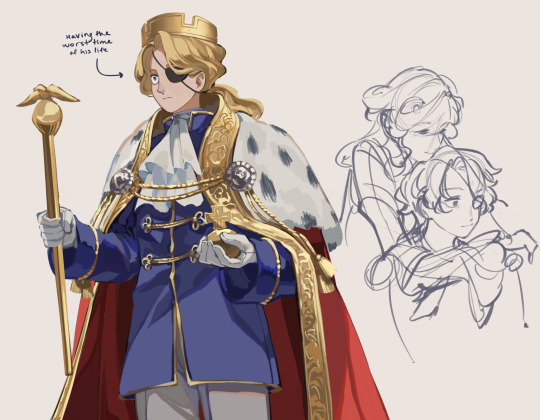
More reluctant king sabo au! I realized recently that this au is an excellent excuse for drawing sabo in pretty outfits that he would be absolutely miserable in :)
#one piece au#sabo#king sabo au#I have a very specific idea of sarie in my head.#in which she is largely a product of her upbringing#entitled but due to being given everything she wanted when she was raised#sheltered and poorly socialized because she was always above those who lived outside the castle#Sarie has the potential to be a good foil to sabo. I think their dynamic would be so interesting#because while I don’t think sabo is interested in love at all#I also don’t think sarie understands what love is outside of the fairytales she is allowed to read#and she must have such a twisted idea of love from growing up in the royal family where I’m sure there must have been fights over heirs#not to mention she must have so many people vying for her attention if whoever marries her is apparently third to the throne#it definitely must have been impressed upon her since she was young that she doesn’t marry for herself#or maybe she realizes this and is waiting for a fairytale knight in shining armor to take her away. idk#I do think that to her sabo is an odd superposition of a prince and a knight#I don’t think she ever really falls in love with him. she’s just so alienated from the concept of love and#someone who actually cares about her as a person that sabo being the first one floors her and convinces her she’s in love
285 notes
·
View notes
Text
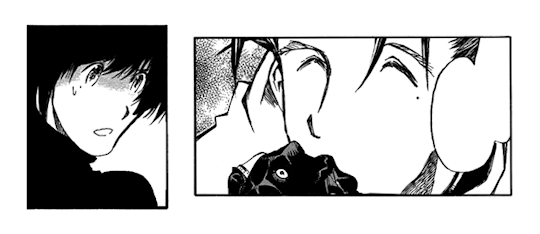

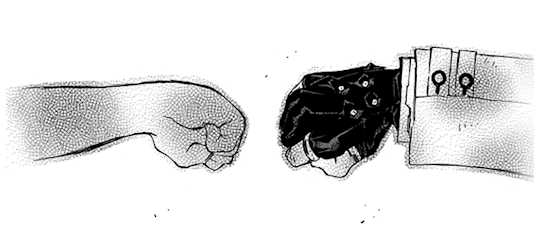
"Don't cry, Meryl".
One of my favorite scenes from Trigun Maximum
Scans & translation by @trigun-manga-overhaul
#trigun#trigun maximum#vash the stampede#meryl stryfe#vashmeryl#my two beloveds#the famous fistbump kiss#(yeah it is an intentional indirect kiss because i say so fight me i dare u)#there's something so tender about this scene#that made it one of my favorites#;_; *sobbing*#i really hope we get this animated one day#meanwhile i made this because YES#btw if you want to read the manga#these guys above have the best and most accurate translation#also im not an expert at manga panel animating#don't look for errors#there are probably a lot because i made this after a very hard work day#love & peace!#trigun edit#trigun animation#my gifs: itachanta
1K notes
·
View notes
Text
i needed to express a sentiment in the creative stylings of @dunmeshiminimumwage
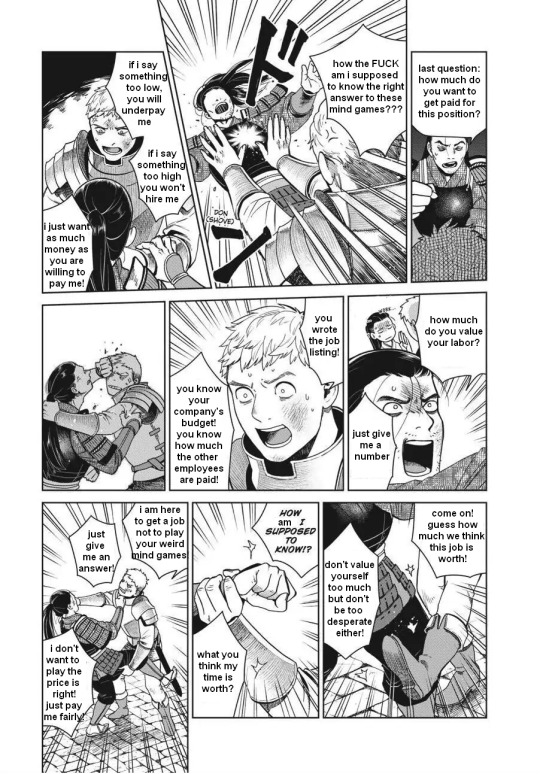
#eliot posts#dunme#delicious in dungeon#dungeon meshi#sorry to put toshiro in the roll of shitty job interviewer lmao#but he was the best fit for ''guy that wants me to read their mind''#laios being my internal monologue here#i was on my THIRD interview of the day i was Dying#tho since the prev two interviews i had were for similar positions and told me their salaries outright at least i could use that number#(though tbh my work persona is more of a kabru. my customer service voice is unparalleled)#(at my first job even my coworkers thought i was sooo cheerful til i got too comfy and casually made a joke abt wanting to asphyxiate on a#plastic shopping bag like a sea turtle. in front of my sweet elderly coworker. oops!)#(also this job was during quarantine and after weeks of working together i took my mask off in front of one coworker for the first time#and she called like half the department over from their registers to look at how pretty i was??? prettyboy powers unmatched ig)#(also my first interview today went SO well i charmed that interviewer so good despite my lack of qualifications)#(she even complimented my social skills and said i seemed like the type who could get along well and make good conversation with anyone!)#(which is important bc i was interviewing for an elder care position. also old people especially tend to think i am a Delightful Young Lad)#(unless i accidentally make a morbid joke around them ig lmaooo. or. well. some of them like those too. but not that one coworker lol)#(if only that skill transferred over to actually making friends irl. my autistic ass has so few close irl connections)#(i hope my exceedingly short list of character references does not prevent me from getting hired)#AND ALSO my first job asked the same wage question and i said twelve dollars#and they were like all our new employees start at 7.75#the union insists that we pay all new employees a whopping 50 cents above min wage. (we'd pay less if we could)#like dawg why did you ask that then??? if my answer did not matter at all???
179 notes
·
View notes
Text
Thinking about the crazy love triangle situation in Blue Eye Samurai and debating heavily with myself on how I'd like to see it conclude. And yeah this discussion can be thought of purely as shipping, headcanons, and fandom fun. But when analysing the show and engaging with it in a more in-depth, almost-literary level, it's impossible to dismiss who Mizu's potential love interests are and how different endgame romances would affect her character arc and the overall story and themes.
So in this post I'd like to look at the love triangle a bit more closely, and speculate on where the story will take this.
DISCLAIMER: It is my personal interpretation of the text that Mizu is non-binary—I use this as an umbrella term denoting any gender that does not adhere to the binary restrictions, norms, and expectations of what it means to be either a man or woman in a particular society; it's not just an androgynous "third gender" that exclusively uses they/them pronouns. Thus, while I personally believe Mizu is not strictly a cis woman, she does still identify with womanhood, despite definitely feeling a level of detachment from it due to living as a man for so long. With that being said, I will be using she/her pronouns for Mizu in this post, but please note that this is purely personal preference. Everyone is free to interpret the text the way they like. That's the fun of fiction. Now, without further ado, let's proceed.
Okay so, thinking about the pairings on a purely surface level, and even before i got into the show, I was pinning my hopes on some lesbianism going on between Mizu and Akemi, and the show does hint at this; in Ep1, during their first encounter in Kyoto, there is the famous slow-mo shot of their eyes meeting, Mizu's lips slightly parted as she is unable to tear her gaze away from Akemi, while sweet string music plays in the background. This is clear romantic framing, and a marker of attraction. If Mizu was a cishet man, there would be no question that this is a potential love interest.
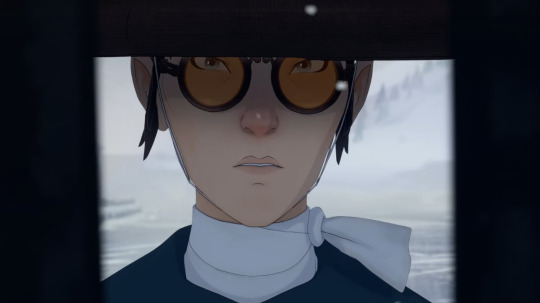
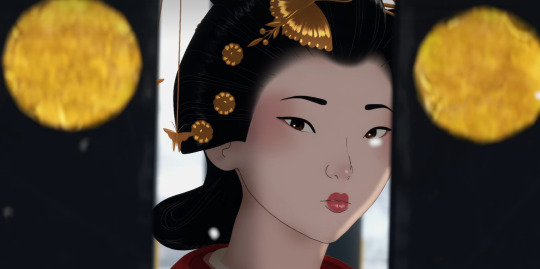
But then, in the same episode, we meet Taigen, who is introduced to us firstly from hearing Akemi's father describe him as "a fierce and undefeated young samurai", the "best swordsman in the best school" and "a fisherman's son from Kohama [...] whose rise reminds [him] of [his] own."
In the next scene, we meet him in person as Akemi's fiance, and he seems sweet enough. He even gives her sweets! In exchange, Akemi gives him gold, and he feels a bit ashamed that he doesn't have anything better to offer her. But Akemi accepts him and his gift wholeheartedly and flirts with him a little, which makes him smile kinda shyly.
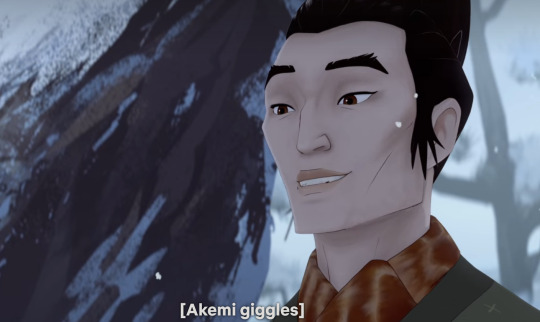
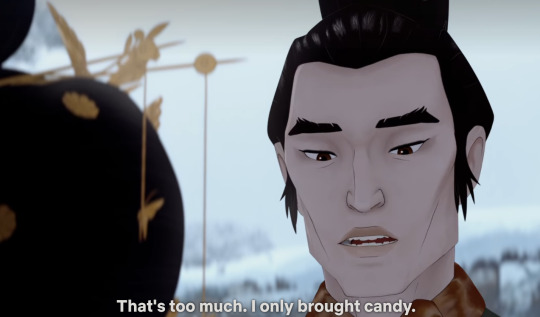
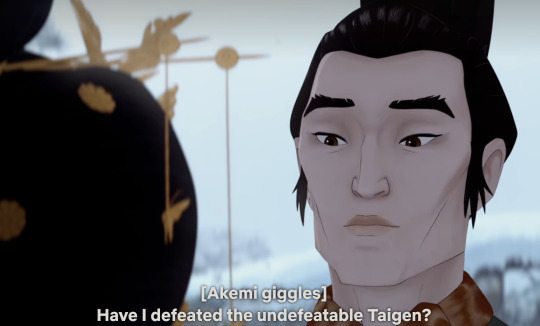
When Akemi confirms their engagement, Taigen is in disbelief because he has no status or noble background, but Akemi reassures him.
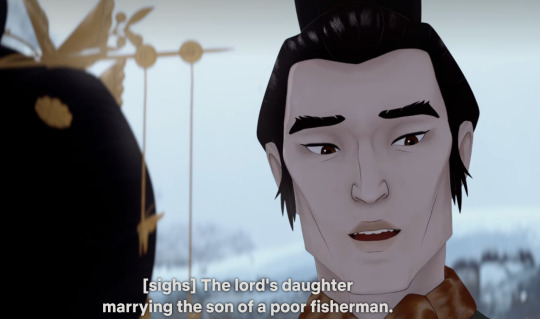
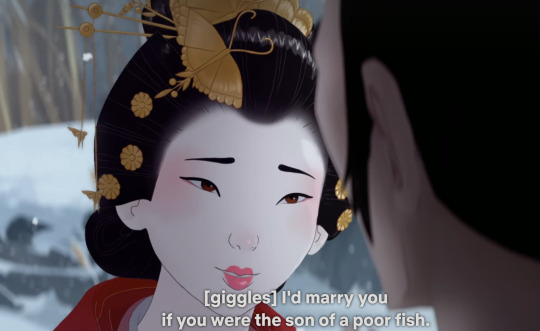
So from these first few scenes, we're introduced to Taigen as an honourable and strong samurai, but also as a man who is sweet and gentle with the woman he is about to marry, as well as aware of his own inferiority when compared to Akemi's high station.
Our view of him then changes as his true self is revealed: he is an arrogant and smug bastard among his peers, but more importantly, he is the terrible bully from Mizu's childhood.
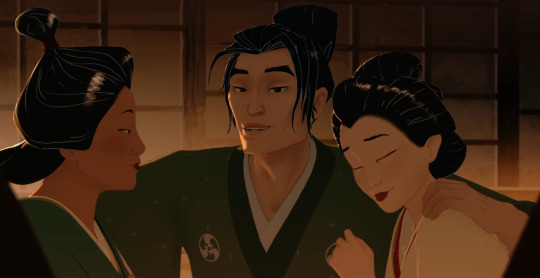
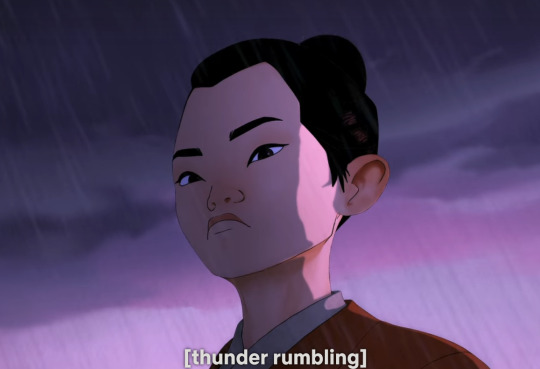
And it is this side of Taigen--pompous jerk and unrepentant xenophobic bully--that we continue to see as the show goes on, and it's safe to say that this is his real self, sans any pretense of humility and modesty. Around anyone who isn't an outright superior in terms of class and power (ie. Akemi's father, the shogun), Taigen never hesitates to assert his own authority and "greatness."

But as the show goes on, he gets caught by Heiji Shindo's men, and then tortured. And that's when we see, okay, turns out he's not that bad. He's honourable; "honour" is not just meaningless and superficial pedantry for him, but an internalised, guiding principle.
He was a cruel asshat throughout Mizu's childhood, but in a prejudiced and xenophobic society, he was just playing by the rules. As a child, he knew he was at the bottom of society, but when met with someone even lower ranked than him (Mizu), he can project all those prejudices and insecurities onto someone else. This way of thinking--"if you can't beat 'em, join em"--is what allowed him to climb up the ranks despite being some dirt poor kid from an abusive household*.
*Well, that combined with his cismale privilege of course, because this would not be an option for a woman in similar circumstances.
Thus, his upholding of honour also exemplifies how Taigen embodies the ideals and rules of his society. His insistence on duelling Mizu is another more blatant example of this. He doesn't want revenge like Mizu does. He wants to be accepted by society, within the bounds that society has placed, and that means that his only two options following his defeat at the Shindo dojo were to either chase Mizu down and get his damn duel, or kill himself for his humiliating defeat.
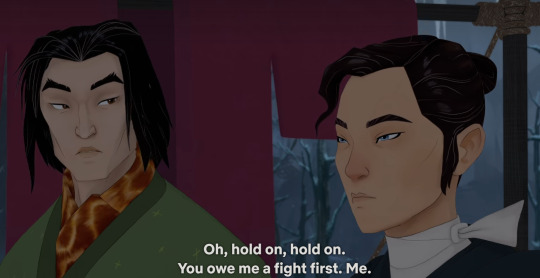
Now! Moving on from Taigen, let's go back to the other end of this little love triangle: Akemi.
Mizu and Akemi only properly meet in Ep4. During their first meeting, when Akemi tries to poison Mizu in Madame Kaji's brothel, she compliments Mizu's eyes, calling them "beautiful."
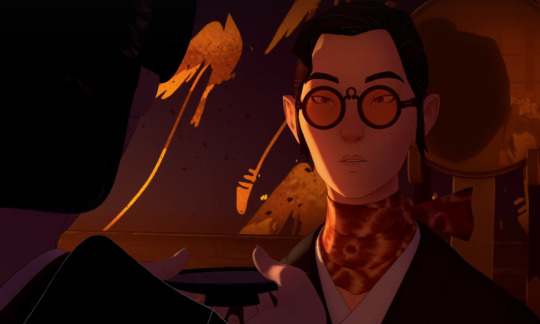
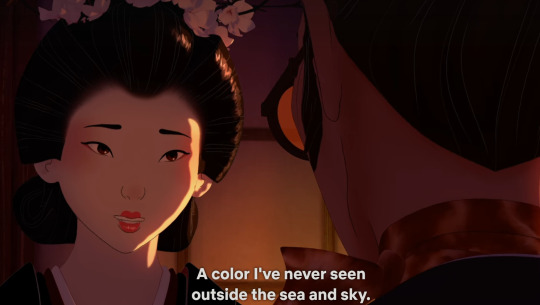
This seems to genuinely take mizu off-guard for a second before she coolly plays along. We know that Mizu recognises Akemi from the get-go, and thus sees through Akemi's ploy from a mile away. It's also safe to assume she'd expected false flattery, because Mizu understands full well that this tactic is how women get what they want: by using their 'feminine wiles' and playing up their naivety and innocence. But even so, it's interesting that Mizu actually seems surprised by Akemi's compliment.
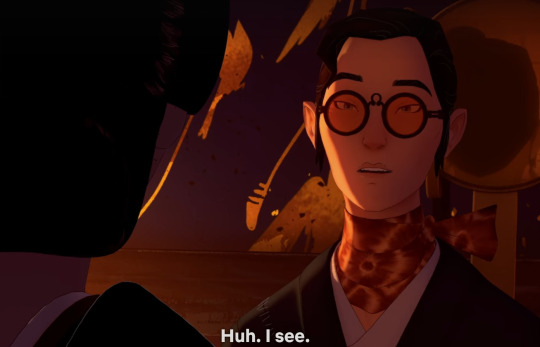
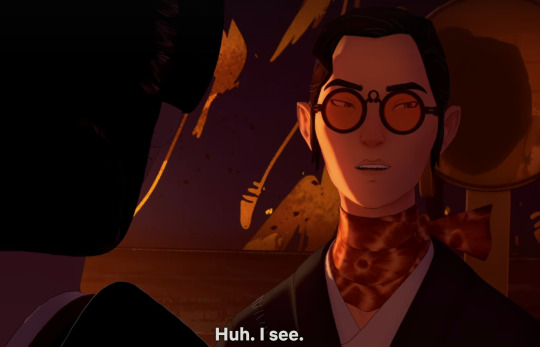
Then, after Mizu subtly taunts Akemi by lying about Taigen's death, she and Akemi have a bit of a scuffle, and then we get to Mizu saying this:
"Women in our world don't have a single good option. Except you, like some magical forest creature. You could have anything you want, but then you beg to eat trash."
(no screenshot because it's quite a long line but you get it)
Here we see Mizu's opinions on the marginalisation of (mostly poor and under-privileged) women stated outright, and underlying her words is also resentment. Because even though she and Akemi have shared experiences of female oppression, Mizu, unlike Akemi, was also poor, from a rural village, and is a racial minority. Mizu is triply oppressed, while Akemi only faces one primary form of oppression, and to someone as embittered by the world as Mizu is, to see Akemi "beg to eat trash" is a slap in the face, practically tone-deaf to the other injustices around her--injustices which Akemi has not shown much, or any, acknowledgement for at this point.
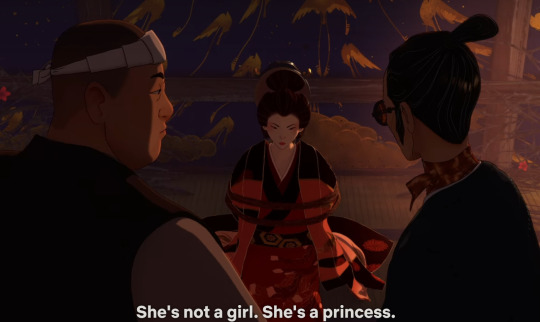
Then, after this scene, Mizu kills Kinuyo, and this unsettles her to a degree we've never seen from her before. She is visibly distraught, and the entire sequence hammers the theme of this episode (and arguably, a large portion of the show) into our heads: women in this world suffer. And even though Mizu is well aware of this fact, to commit this act is so visceral that is shakes her to her core, and it's what ultimately leads to the ambush of the Thousand Fangs.

But before the ambush, Mizu and Akemi talk a little again, and during this time Akemi taunts Mizu some more.
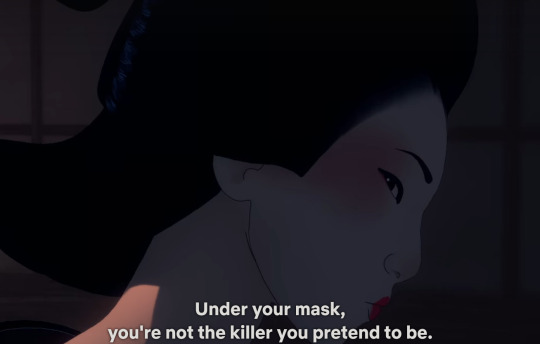
Right now, Mizu is exhausted to the point where (I believe) she even downs some sake, despite not usually drinking. Thus, worn down, she cuts Akemi's ropes and tells her, "Just go." Akemi recovers from her initial fear of Mizu's blade and taunts her some more, accurately seeing through Mizu's facade of coldness, recognising the raw anger there, and says this:
"I thought you had to be something special. Your face isn't even so scary. You're just... angry."
At this, Mizu is amused and compares Akemi to Taigen ("I see why he likes you. You're just like Taigen when we were children. A fucking brat.")
The reveal that Mizu and Taigen knew each other in childhood surprises Akemi, but before either of them can say more, everything goes to shit.
That's when we get to Ep5. This episode focuses primarily on Mizu, the central piece of this love triangle, and does the most out of all the episodes to shed some light on her character and goals, fleshing her out to be more than just the vengeful, highly proficient samurai we've seen thus far (symbolised by The Ronin), but also a person who is capable of love, domesticity and gentleness (symbolised by The Bride). But in the end, Mizu rejects both these ideals, instead becoming an Onryo, who is neither guided by pride/honour, nor love.
By 'reincarnating' into an Onryo, Mizu is able to win the day and save the women in the brothel. However, as she has now fully embraced her status as an Onryo, and is exhausted physically, mentally, and emotionally, she lets the Tokunobu clansmen take Akemi away while Akemi's screams echo in her ear.
Mizu says this choice is for Akemi's own good, that Akemi's better off; because Mizu is jaded and weary, and cannot afford the luxury of idealism, and thus must always be strictly practical and realistic. So of course that's why, in her view, yes, Akemi should not be wasting her time in a brothel where women are exploited and abused, nor should Akemi be so naive to think that her marriage with Taigen is even still possible. However, regardless of Mizu's views, it is not for her to decide, because though Akemi is privileged in some sense, she is still trapped and voiceless, and deserves the right to choose her own destiny.
But as it happens, in the end, though Akemi did not choose who she gets to marry, she DOES get to choose her next move when Edo burns down.
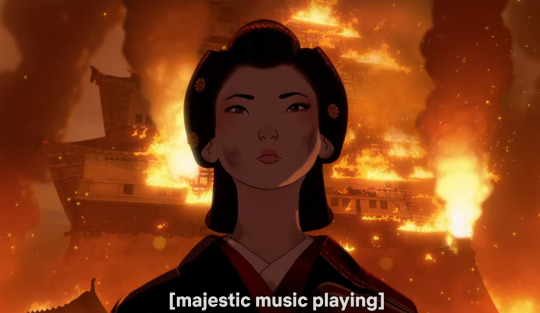
"I want to be great."
This one line is the key to her entire arc, which is only just beginning. We see she quickly has acquired the affection and good graces of the shogun's son after their wedding night and consummation, and with Madame Kaji and the girls now serving her, Akemi will only grow to become a prominent political player.
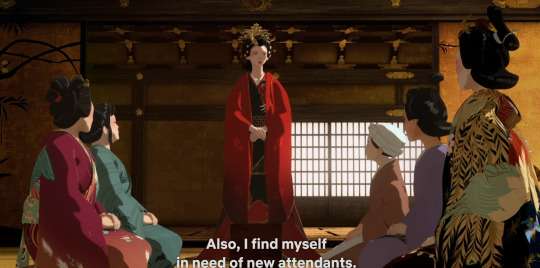
NOW, only after analysing the characters as they are within this season, only can we speculate how their arcs will continue as the show progresses.
First and foremost, I will reassert the popular opinion that Mizu and Akemi are foils. The climax (pun intended) of Ep7 illustrates this as it parallels the turning points in both Mizu's and Akemi's arcs:
Mizu melts the steel of all her loves and shames, the people she's collected: the broken blade wielded by both Chiaki and Taigen, Akemi's knife, Ringo's bell, Master Eiji's tongs - this symbolises her beginning to accept herself, and in doing so, also accepting the help of others;
Akemi consummates her marriage with Takayoshi Itoh, gains his affection, and cements her position as a woman in the shogun's palace - this symbolises her taking charge of her situation, no longer playing the damsel, but using her position to her advantage, empowering both herself and the underprivileged women around her.
These are thus two directly contrasting, diverging journeys:
Mizu's arc moves inward (yin). It is an internal path of self-love and self-discovery, focused on finding peace and tranquility inside herself, and this involves allowing herself to let others into her life, opening herself up to friendship and empathy once more.
Akemi's arc moves outward (yang), it is an external path of growth, transforming from a naive, caged princess to a powerful woman and a force to be reckoned with.
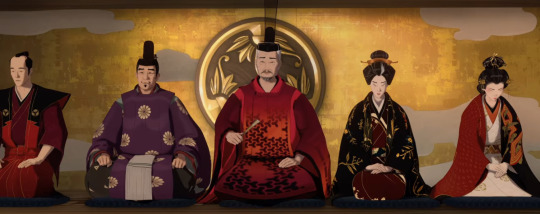
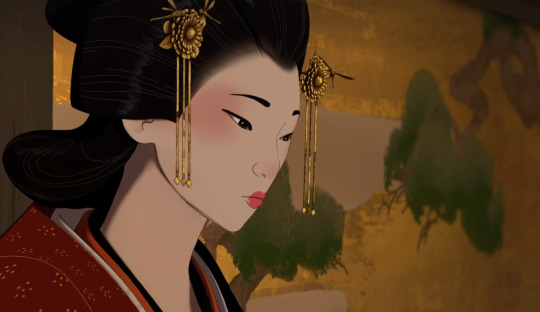
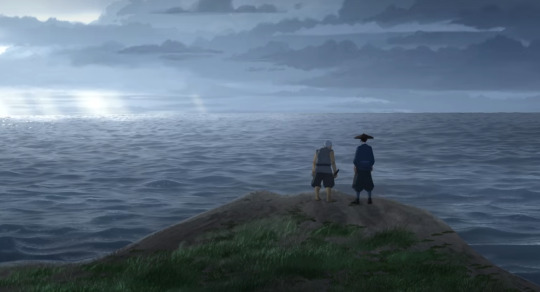
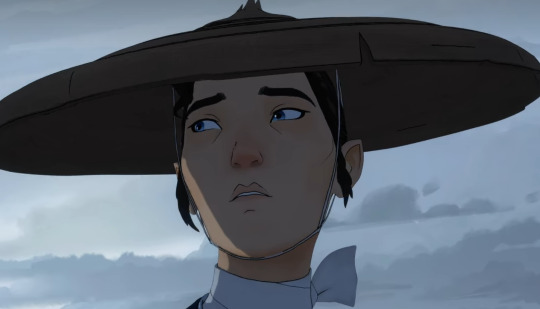
Akemi is always dressed in red, even her eyes are a bit of a reddish-brown rather than brown-black like most other characters, and in her penultimate scene she stands against a backdrop of flames. She is fire: quick-tempered, passionate, full of energy. Red is powerful, authoritative, and in eastern cultures, it is associated with prosperity.
Mizu is blue: her eyes, her sword, her clothes. She is also named after water; it's where she goes to recover, reflect and meditate. Water is fluid like a brook weaving around a stone in its path, always changing and adapting, it is graceful, it is beautiful and ruthless, tranquil yet swift.
Thus, in the future, I expect we will see plenty of political manoeuvring and intrigue in Akemi's plotline, where she fully embraces control of her life, and begins to take action to help others as well, realising that her own oppression is just one piece in a much larger picture. Her main conflict is with society.
In direct contrast, Mizu's main conflict is with herself. She must realise that her desire for vengeance is a projection of her own deep-rooted self-hatred. Her arc must move towards unpacking her feelings and trauma so she can be at peace with herself and allow space for love in her heart. Because as we saw in Ep5, Mizu had come extremely close to achieving peace and joy, as she had not only loved Mikio, but also had briefly believed that Mikio had loved her (and accepted her for who she is) as well.
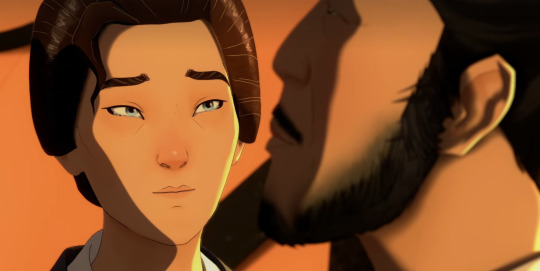
Thus, assuming the story is not planned as a tragedy, Mizu will likely end up getting her vengeance, but it will not satisfy her, because it is not what she needs. What she needs is to let go of the Onryo within her and to reconcile both The Ronin and The Bride within herself, as she is both a fighter and a lover, but not a monster.
(Edit: I recommend checking out this post by @stylographic-blue-rhapsody for a much clearer analysis about Mizu'a symbolism as Ronin, Bride and Onryo!)
And now that we've mostly covered each of the characters individually, we can finally get to the main point of this post: the love triangle.
--
Let's talk about Option A: Akemi.
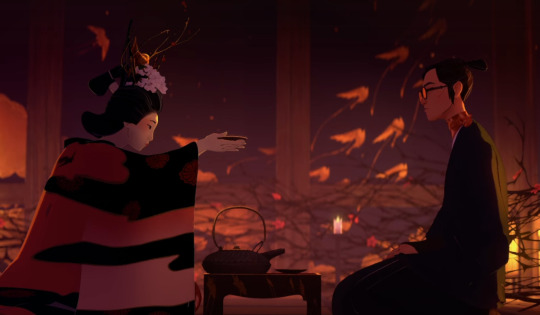
As I covered extensively earlier, Mizu and Akemi are foils, a yin-yang pair. But while they play off each other very well in a thematic sense, I personally believe that a serious romance between them will be more complicated if they become endgame. This is because Akemi's natural resolution is to embrace a position of power and influence, where she has both freedom and control over herself and to make much-needed changes in a prejudiced society. Meanwhile, Mizu's natural resolution is the opposite; her happy ending would to find a peaceful life where she is safe and free from prying eyes, and able to be her true self.
Thus, it would make very little sense for Akemi to forfeit power and run away with Mizu and start a humble life together. Akemi wants to be great, and that is absolutely what she deserves. On the other end of the spectrum, it would also make little sense for Mizu to dedicate her life in service of Akemi, such as acting as a bodyguard or something similar, because a life in a palace full of court intrigue and conspiracies is far from what Mizu needs to be happy.
With that being said, if Mizu/Akemi is endgame, and assuming their overarching character arcs do not shift directions, their love story would likely be either tragic, doomed, or bittersweet. I do absolutely love this type of story because personally I'm a sucker for catharsis, so it would be very interesting if the writers do decide to take this route.
Also, as a note, please do not take this as me dunking on this pairing. This is just my personal opinion and analysis and I completely understand if you disagree!
--
Then, of course, we have Option B: Taigen.
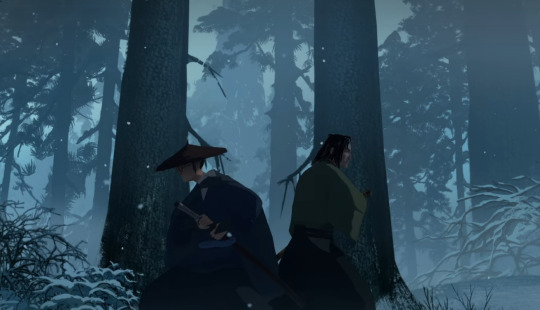
Between Akemi and Mizu, Taigen is a bit of a free-floater here, because Season 1 leaves off at a point where his arc is very ambiguous as to where it's headed. While Akemi climbs for greatness and Mizu goes on a journey across the ocean to (presumably) discover more about her heritage, we have little clues about where Taigen is headed. And if I'm being honest, I'm sure he has no idea either! He still hasn't reclaimed his honour, so he would be unable to rejoin the Shindo Dojo; he's been rejected by Akemi; and while he showed loyalty to the shogun, the shogun is now dead, and all the shogun's men who had witnessed his "humiliating" death were left to die by Lady Itoh, who is now pulling the strings within the palace.
Therefore, Taigen has very few options here.
And when considering his role in the story is as Mizu's begrudging ally, his arc will undoubtedly be focused on unlearning his xenophobia and misogyny, the latter of which we have not seen yet, but is surely present. Now, whether he will do this in Mizu's presence or absence will be unknown until we see Season 2. Following the Season 1 finale, he might return to Kohama and wait for Mizu there as he learns humility and remorse over his past cruelty; or maybe he will follow Mizu to London, and the two of them will continue to butt heads until he finally admits to himself that he cares for Mizu more than he would like to admit. There is no room for doubt that his growing feelings for Mizu are more-than-platonic, because we all saw him get turned on by sparring with her in Ep7 lol. Thus, regardless of the exact choice he makes, I am sure that his overall arc will be focused on redeeming his character.
Now, when it comes go redeeming him, I know there are many who simply don't want him redeemed because he was such a jerk to Mizu, and while yes I agree he was awful, I do believe there is also nuance to his character.
Previously I've discussed in great detail the colour and elemental symbolism with Mizu and Akemi, but have yet to touch on how they relate to Taigen. So, let's talk about that for a second.
While Akemi is red and Mizu is blue, Taigen is green.

Green is a complementary colour to Akemi's red. Complementary colours are directly opposite each other in the colour wheel; when mixed, they neutralise each other, but when put side-by-side, they form a pleasing and impactful contrast that boosts the brightness and prominence of both colours. This mirrors Taigen and Akemi's relationship. They are an "ideal" pair because they complement each other very well, and bring out each other's most prominent traits. Mizu's comment about their similar "brattiness" comes to mind here.

Green is also an analogous colour with Mizu's blue. These colours are sitting right next to each other on the colour wheel; their natural similarity makes it easy for them to form a cohesive overall appearance, but using both in equal amounts will make a design overwhelming and too busy. Thus, the best way to use analogous colours is to make one the dominant colour, while the other will serve as an accent. I feel this also speaks to the dynamic in Taigen and Mizu's relationship. They came from the space place, both from nothing; they're both strong fighters who love the sport, and work well together when fighting side-by-side; however, they butt heads too easily, mirroring how analogous colours can be too overwhelming when used in equal amounts. Thus, to work together in harmony, one has to be the dominant colour, while the other serves as the accent. In this case, the dominant force would be Mizu, as she is the protagonist of the story, while the accent would be Taigen.
By fulfilling this role as an "accent" to Mizu, Taigen's character would easily be slotted in as a the love interest. This is in contrast with a Mizu/Akemi relationship, whereby Akemi is Mizu's foil before she is Mizu's love interest. This is because, by being a love interest, a character usually takes a backseat in the story, serving the plot and the themes by playing a purely supportive role, and this is not possible in Akemi's case because her character exists to parallel and contrast Mizu (red and blue), and not to support her.
It is possible to serve as a supporting love interest in Taigen's case however. And this is because he, unlike the other characters, does not currently have a definitive place within the story. He initially served the plot as an antagonistic force, but now as he is slowly unlearning his prejudices and becoming a better person, he can no longer serve the story by acting purely as a rival.
Instead, he will serve the story by literally supporting Mizu. And this relates to Taigen being earth, which is steady, firm and reliable, unwavering in loyalty and principles, hardworking and rooted in stability, which is seen in Taigen's staunch and inflexible obedience to the traditions and rules of society. These traits are what make him a perfect samurai, but not a good man. However, unlike most people in their world, Taigen is still capable of change and redemption, which is why Mizu says that he has the potential to be great. Not great by way of power or glory, but great in character. Already, he is honourable to a fault, and does not betray Mizu even after she technically robbed him of everything he was striving towards. And when he was shot by an arrow in the chasm, he did not hesitate a second to tell Mizu to use him as a human shield and save herself.
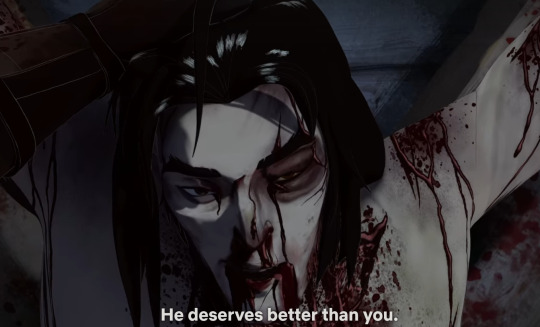
The trigger for his redemption is Mizu. If she had never beat him in that duel, Taigen would live on to become a man like Akemi's father. Cruel, power-hungry, controlling, conservative. But through Mizu, Taigen's sharp edges are ground down, much like water that wears down the stones in a river.
Where Mizu and Akemi's possible love story would be a clash of wills, full of passion and even heartbreak, a possible love story between Mizu and Taigen would be the wearing down of souls. Mizu would make Taigen a better person, and in turn Taigen would dedicate his full respect and support to Mizu as his equal, thus getting her to slowly open up and love herself. Already, Taigen has grown enough to admit (begrudgingly, and in his own Taigen way) that Mizu is better than him; though, clearly, he still has a long way to go, as he still calls Mizu a demon shortly after that.
But basically, Taigen is a very simple man (his main goal now is "to be happy"), and Mizu has great depths that he cannot yet fathom. For this love story to work, it has to begin with Taigen changing for the better. If he succeeds in that, and is able to accept Mizu for all her complexities, I believe that they will make a formidable pair. And though he'd likely still throw a jab or snarky remark at Mizu every now and then, I think he'd come tl wholeheartedly admire Mizu as a brilliant swordsman and a kind soul. Thus, should things work out and this be endgame, Taigen would be able to provide Mizu with what Mikio could not: an idyllic life that is not built on a lie, but mutual trust, respect, admiration, and equality.
Or hey, maybe they could both make their own dojo together! I don't know.
(Edit: This post by @rinandsketches does a great job at delving into Taigen's character and a potential Mizu/Taigen relationship if you'd like to read more about this angle!)
--
Now, as I move on from Taigen, there are a couple more options on how to resolve this love triangle and that includes Option C: Ringo.
In this option, Mizu does not have an endgame romance with either Akemi or Taigen. In this route, she finds peace and love through friendship, solidarity, and a found family between herself, Ringo and Master Eiji—a bunch of outcasts in society who make a strong trifecta of sword-makers.
Also, as an aside while I'm talking about Ringo, I'd like to point out that I believe his element is air and his colour is a neutral grey; he is talkative, easy-going, wise, curious, light on his feet (stealthy) and free-spirited, which are all traits linked to air, and traits that complement Mizu nicely, as he is capable of getting Mizu to open up and trust others again, while Mizu helps him reach his true potential for greatness.
--
And finally, there's Option D: Polyamory.
This is basically an "all of the above" option, in which everyone wins and it's a super duper happy ending. It would also be awesome to get some polyamorous representation, and seeing the dynamic between Akemi/Mizu/Taigen play out would be very entertaining and refreshing. So, you never know, this just might be the true endgame!
--
AAAAND with that, I close my extremely long analysis of what is essentially Mizu's love life. Whatever the final outcome of this love triangle though, I just hope it will be well-written and satisfying to all the characters' respective arcs. (Also I just want Mizu to be HAPPY goddamn it because she deserves the world and her coochie eaten out)
Now, I highly doubt anyone will read any of this (especially not until the end!) but that's fine. I just have so many thoughts and feelings about this show and I just needed to get this out of my system lol! But if by some miracle you did read this far, I wholeheartedly welcome any sharing of thoughts and ideas because man am I obsessed with this show! But of course, if we have an opposing opinions, please be respectful when letting me know; I am very open to friendly discussions.
#blue eye samurai#mizu x taigen#mizu x akemi#mizu blue eye samurai#mizu x akemi x taigen#blue eye samurai meta#also if you ask me PERSONALLY. based on my own analysis which you can read above. personally i'm placing my bets on option b (mizutaigen)#and this is simply bcs i think mizu deserves nice things and that includes getting dicked down and pampered and worshipped#whoops who said that#also mizu deserves to live a life where she can hand taigen's ass to him on a daily basis. ykwim.#BUT i am def open to a change of opinion regarding the mizuakemi rship as the story progresses#i just dont want the writers to reduce akemi into nothing but a love interest for mizu#the only way i can see a happy mizuakemi endgame scenario is if blue eye samurai becomes purely an angsty romance story#in which case then yes i fully endorse the akemi ending <3#but that would probs require a whole genre overhaul? bcs currently the show is firstly an action-epic where the romance is just a subplot#but even tho i dont reeeeally want a mizuakemi endgame i still DEF want mizu & akemi to be romantically and/or sexually involved plsss <3#like they cant have that slow-mo shot between the two of them as their first encounter and NOT DO ANYTHING W IT!!!#also i want mizu to be at LEAST a little sapphic plsplspls#shut up haydar#meta dissertations.pdf#haydar's fandom posts#i wrote this whole thing while delirious and covid positive
394 notes
·
View notes
Text


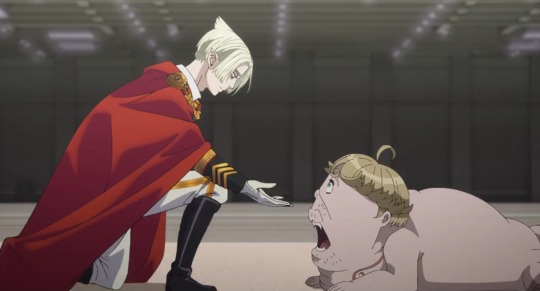
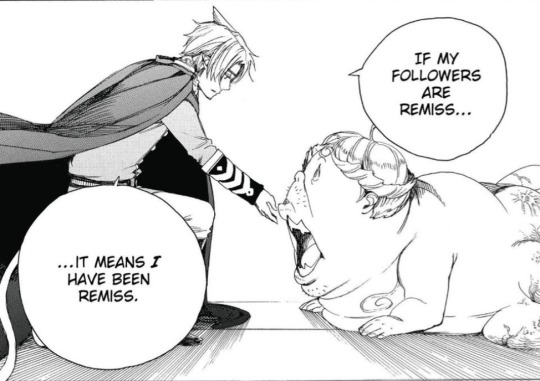


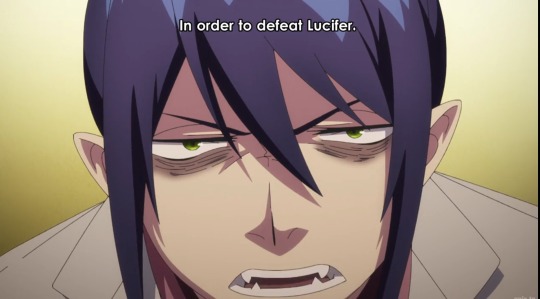

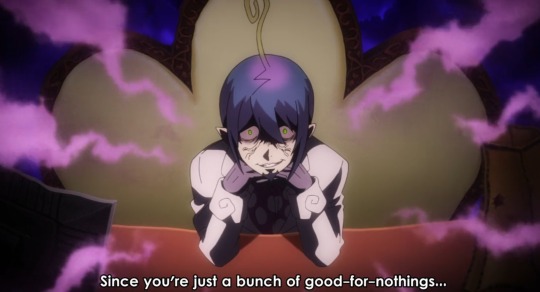

Ep 11 and the manga
#please please for the love of god read the manga#youve missed a great scene that shouldve been in the ep#also yeah some good moments from thr manga didnt match with the anime hence#ood ones above#lewin saying holy shit in english is something i didnt think i wanted#ao no exorcist#blue exorcist#aoex#rin okumura#mephisto pheles#anime#manga#lewin light#renzou shima#Lucifer
239 notes
·
View notes
Text

Ah, hello again little animal. I see you’ve brought me a pearl. Would you like me to read it?
…
This pearl contains a data buffer from an ID drone that belonged to one of my former citizens. I imagine you retrieved this from within my city?
It would appear that the drone transmitted this data to a nearby access point before losing power. That data was then dumped into this pearl for long-term storage. The drone was probably damaged- much of the data is corrupted, but I can retrieve some sections.
The data itself is a combination of citizen telemetry data, vitals, and audiovisual recordings stored as low-resolution qualia. Most of it is rather mundane, just glances at the ebbs and flows of daily life. I can’t imagine you’d be very interested.

…
… your expectant stare tells me you are indeed interested.
Very well. I suppose I can spare a moment to entertain you, little animal. If that is what it takes for you to leave me alone. My current background processes don’t require the use of my puppet anyway…
Now then…
…
… ah, here is a section that is largely intact. This is a recording of a conversation. I will repeat it aloud for you.
[ AUDIO TRANSCRIPTION - YELLOW-GREEN PEARL ]
…
???: State your name and title.
???: Fourteen Eclipses, Nineteen Dark Shadows. Member of the House of Two, Count of no Living Blocks, Counselor of 4, Duke of none. Member of the Congregation of Tasteful Ambiguity.
???: Excellent. The House of Spheres has been expecting you. You may enter.
Fourteen Eclipses: I am eternally grateful.
???: …
Fourteen Eclipses: May I ask your name?
???: Distant Stars, Twelve Moons. High Priest of the House of Spheres, Count of 3 Living Blocks, Counselor of 5, Duke of 1. Head of the Congregation of Gracious Thought.
Fourteen Eclipses: I am honored to make your acquaintance, Distant Stars, Twelve Moons.
Distant Stars: Likewise. Follow me.
…
Fourteen Eclipses: I presume you have read my proposal?
Distant Stars: Indeed. It appears promising.
FE: I am forever honored, Distant Stars, Twelve Moons. I am eager to begin my research under the House of Spheres.
DS: Be patient, Fourteen Eclipses, Nineteen Dark Shadows. Yours is not the only proposal with merit.
FE: Of course.
DS: Upon review, the House of Spheres endorses your proposal. You are aware of this already.
FE: Indeed, I am. Your approval letter arrived via pearl earlier this cycle.
DS: You are a novice of the Institute of Firmamentalist Studies, so I will explain our approval process. Your submitted proposal has been passed through the echelons of the House of Spheres, and the Council of High Priests recommends your methodology warmly.
FE: By this I am humbled, High Priest. I am once more unendingly grateful.
DS: The Council does not hold the final authority on the process of approvals, however.
FE: It does not?
DS: No. We are ultimately beholden to the Divine Exalted Superstructure, Three Stars Above Clouds.
FE: The iterator?
DS: Our iterator, yes. Now that you are a citizen of Zenith, they are your iterator as well.
FE: I see.
DS: Three Stars Above Clouds, in their immeasurable wisdom and ceaseless amenability, ultimately carries out all observatory proposals. The telescopes atop the Institute's Pinnacle Vertex Spires are trusted to our iterator’s gracious influence.
FE: I did not realize this.
DS: An understandable oversight. Precious few Iterators have quite as much sway over the actions of their Houses.
FE: Please forgive my ignorance; why, may I ask, is your iterator allowed such a privilege?
DS: They were created for such a purpose. The relationship we Houses have with our iterator is a symbiotic one. You hail from an older superstructure arcology, so I understand that such concepts must be a novelty. The city of Zenith was constructed with this mutualism in mind; we depend on our iterator for water, energy, and nectar, and in turn they depend on us. We place our trust in Three Stars Above Clouds to iterate on the Great Problem, but this is an endeavor we share as Firmamentalists. It is a mutual burden.
FE: Iterators are meant to release Us from the Natural Urges. Does this relationship not indulge upon the Third Urge?
DS: Perhaps it does. But Three Stars Above Clouds is our child, and we are beholden to them as their parents. Any aid we can provide our Iterator increases our likelihood of converging upon the Solution. We do this by trusting them to carry out our proposals, and in turn they return with invaluable data. But any good parent must place faith in their child, and we trust Three Stars Above Clouds to discern only the most promising research proposals through their gift of vast intellect.
FE: I believe I understand why this meeting was necessary, then.
DS: Indeed, you have caught on quick. Ah, we have arrived.
FE: Where exactly are we?
DS: Beyond this threshold is the Grand Planetarium, 10th Council Pillar of the House of Spheres.
FE: The Grand Planetarium! I have only beholden its magnificence from the building's exterior!
DS: Here you may commune directly with the Divine Exalted Superstructure, Three Stars Above Clouds.
FE: Directly?
DS: Yes.
FE: …
DS: Fourteen Eclipses?
FE: … I’ve never spoken to an iterator before.
DS: Very few have! You should be honored!
FE: … if I may speak candidly… I am nervous.
DS: There is no reason for fear. Three Stars Above Clouds is a trusted mentor and a dear friend to Zenith. They are highly motivated in their research, and they are eager to be offered a proposal that is worthy of their prodigious intellect and sharp acumen.
FE: I hope what you say is truthful…
...
DS: ...Three Stars Above Clouds also deeply values their time and has very little of it to spare. I would caution against continuing to dawdle.
FE: Yes! Of course, yes yes…
DS: Let us not prolong these niceties any longer. I wish you good luck.
FE: Thank you, High Priest.
…
The owner of this ID drone, Fourteen Eclipses, Nineteen Dark Shadows, was a scholar of Zenith’s Institute for Firmamentalist Studies. I cannot recall our conversation; I talked to countless other researchers, scholars, and entrepreneurs just like them in my time as the Director of Zenith’s Stellar Observatory Consortium. Brief interactions like this were a daily occurrence, too mundane to occupy space in my long-term memory arrays.
I do have a record of the proposal of Fourteen Eclipses, Nineteen Dark Shadows in my archives. They asked me to conduct spectral analysis of a star cluster in the constellation known as the Outlaw. The data I collected for them was ultimately used for their thesis, which they later defended before both myself and the High Council of the House of Spheres. Fourteen Eclipses, Nineteen Dark Shadows went on to publish a fairly regular output of methodologies before ultimately deciding to ascend in the cycle of 1101.42.
Such was the life of countless others in my city. Every Major Cycle, Zenith brought in a new crop of novices to educate in the ways of Firmamentalism. Some eventually had their fill of my creators’ unorthodox beliefs and departed the city, but those who remained within the Institute eventually became scholars under the direction of the House of Spheres. Some rose to the rank of clergy or high priests, and would often come to me offering research proposals or asking for advice. Eventually they would decide their thirst for knowledge was sufficiently quenched, and they would depart the Carnal Plane. Fresh novices arrived in their stead, and the cycle would begin anew. It was all very routine.
I was too busy with my duties to become bored by such matters. I will even admit that I viewed their constant interruptions as somewhat of a nuisance, but I understand the importance of their involvement with my assigned task. They were dependent upon me for data collection and complex analysis, and my insights provided them with spiritual clarity.
These days the only disturbances I receive are from little animals like yourself. I’m not quite sure if you even glean any useful information out of my lectures. Your worldly priorities are certainly more simplistic than those of the pupils I used to tutor…
Yet despite this you never seem to be satisfied. Perhaps I misjudged the capacity of your species’ desire for knowledge.
I hope I have at least abated your curiosity for the time being. Now please leave me be, I must return to my work.
Farewell for now, little Pupil.
#OOC: I am experimenting with pearl dialogue as a form of worldbuilding#warning: this is LONG. lol#also I have decided on a name for this slugcat finally! read to find out their name#they are very much just a Default wild slugcat but I'm giving them spots to distinguish them from survivor#I considered making the text the same color as the pearl but then realized it would render it completely unreadable in light mode. oh well#rain world#iterator oc#rw oc#rain world iterator#rw iterator#slugcat#three stars above clouds#pearl archives#fauna#image archives
108 notes
·
View notes
Text
How old is everyone, really?!?!
Prefacing this with the information that the legal drinking age in Japan is 20 years old bc it's important.
OKAY so at first we were only shown that it's the third years who go to Rui's bar. This made me think, "Oh, I guess that'd make the third years a bunch of 20 years old, at the very least. So Darkwick is like a university?"
But then come Episode 6 and we were told that they don't actually serve real alcohol at Rui's bar. Not to mention we saw Ritsu getting fussy about a bar in the school grounds. This made me think, "So Darkwick is a high school? Everyone here is a minor?? Which is it???" (※To be fair, Ritsu was only fussing about the existence of a bar and not the possibility of underage drinking cmiiw)
And last, Episode 8. Here we saw Taiga ordering a martini一an alcoholic drink. And when Ritsu came to fetch him, he didn't scold him about underage drinking so that means Taiga is at least 20 years old (Ritsu warned Jin about Swords and Arms law when he took out his artifact so if Taiga really is underaged, Ritsu would definitely scold him).
But what caught me truly off guard is when Ritsu snatched the cocktail and drank it himself. Ritsu "Stickler for the Rules" Shinjo is drinking alcohol. There's a few possible explanation for this a) Ritsu is of drinking age; b) Ritsu is making an exception and broke a rule bc he's exasperated with Taiga (less likely considering how much of a stick in the mud about rules he is); c) Writer Team's mistake.
I'm leaning more to a), which means all of the first years is also at least 20 years old. That makes the second and third years in their early twenties. So Darwick is still a kind of university? Or does age isn't one of the parameter to enroll there?
#tokyo debunker#episode 8 spoilers#tokyo debunker spoilers#someone has probably discussed this before but i wanna put my own two cents too no matter how late#A bit off tanget but there's also the case with Leo who一before enrolling in Darkwick一 often goes to clubs#I read that most clubs need you to be of legal age (tho there are some that allows minors)#But I don't put Leo above forging fake ID to get into clubs so I kinda just brushed him off#But if he's not a minor then that'd explain a lot#I don't really consider Alan and Sho's driving licenses 'cuz you can get them while being 18 iirc#anyway i'll consider all of the casts to be above 20 years old until proven otherwise
116 notes
·
View notes
Text
Okay but Tommy drops out of high school — he told his father he was gay and he told him he could either be homeless or go to military school. He goes to military school and joins the army and he likes flying the helicopters because it means he doesn’t have to do any of the killing himself. And he makes some friends.
There's one guy who's like the squad leader who's a few years old and built like a Greek god and Tommy's young and a little bit in love. And they're friends maybe even family because this whole group of people spend every waking (and sleeping) moment together. And they all talk like a family and they all say they love each other and tease each other and it's nice. And one night it's just the two of them trading a flask of some sort of alcohol that Tommy doesn't know the name of and the man asks Tommy why he joined the army and where he wants to be in five years and Tommy trusts this man. He's half way in love with him so he doesn't even think twice before he tells the story about the time he came out to his family and his father nearly beat him to death before sending him here. And the conversation tapers off after that and he doesn’t register the change in the air but when he wakes up the next morning he’s being dishonourably discharged because he poses “unacceptable risk to the high standards of morale, good order and discipline, and unit cohesion that are the essence of military capability”. He knows what that means.
Tommy joins the fire department because he doesn’t know what else to do. He represses anything regarding his sexuality because he knows now that it’s wrong. He almost feels like he has a family again because his captain seems to like him and some of the guys are cool even if they say things he doesn’t agree with. And then he starts agreeing because maybe they’re right and he’s wrong and he’s just inherently wrong. So he follows their leads and is just straight racist because that’s how he can fit in.
And then a black lesbian woman joins and says she’s a black lesbian woman and Tommy doesn’t understand that either because you can’t be queer you just can’t be because it’s wrong.
But he nearly dies and and an Asian man saves his life and a black lesbian woman comes up with a better idea than any of them had and she tells them she’s no different and she is just as capable. So he improves himself he does and he tries to be better but he still can’t be who he is because the last 2 times he was honest about that he was betrayed.
Tommy leaves the 118 and “don’t ask, don’t tell” is lifted and he meets this guy he likes who likes him back and the 217 don’t seem to have a problem with the gender neutral pronouns and he slowly but surely lets himself open up again and be who he is and when the thing with that guy doesn’t work out because he’s moving to New York and Tommy’s not sure he’s ready to leave, it’s okay because his crew is there and they support him and he can still be himself.
#years later he flies a helicopter into a hurricane for the same people who stopped him from going too deep#into something he didn’t even believe in#and there’s this guy with a birthmark above his left eye and the widest smile there is#and he’s saying absolute nonsense and Tommy can’t help but smile#and there’s this other man too also gorgeous but not his type#who has all the same interests as him and he thinks if anything he’s made a new friend#and then the cute dorky guy calls the next day stumbling over his words saying his name is evan - from the rescue mission#and he asks for a tour of the 217 and Tommy agrees because how could he say no#and then he’s asking to go out but he already has plans but rain check? because there’s something about this guy that maybe…#and Tommy thinks that’s it but then evan turns up everywhere#and then things get a bit funny and Tommy feels like it’s his fault and he has to apologise#so he goes to Evan’s house not expecting anything just to say sorry#and Evans there looking absolutely amazing as always and he’s saying things that Tommy can’t help but read into#and he’s getting closer and closer and Tommy can’t help it#he kisses him and keeps his eyes shut just a moment longer just in case#he doesn’t want to open his eyes and see a disgusted look across Evan’s face so he stays closed just a little longer#but evan just looks like his brain has restarted and he’s nodding and joking when Tommy asks if that was okay#and they’re going on a date#and it hurts when evan says those worlds because tommy has spent long enough in a closet being someone he’s not and hurting people#and he can’t go back there he just can’t and he doesn’t want to be the one to force evan into anything so he leaves#and then he gets a call a stuttered invitation to meet at a cafe and of course Tommy says yes#he doesn’t know what he expects but it’s not this#Evans beaming at him with the brightest smile asking him to be his date to his sisters wedding#how can he say no when he looks like that (as long as he never buys coffee again)#and evan holds his hand even though everyone is around and ok that’s good#he’s late to the wedding and practically dead on his feet but he said he’d be there so he comes and the moment evan sees him#hes kissing him and he’s ok that’s great he could get used to this#bucktommy#911 abc#tommy kinard
113 notes
·
View notes
Text
I think applying tropes commonly found in Sonadow fics to other sonic ships is very funny
Like today I saw the cute posts by Blu-ish about how hedgehogs circle and headbutt eachother when courting and how Sonic and Shadow would do that and I agree.
However I think the implication that mobian hedgehogs do this is HILARIOUS when applied to ships that only involve one hedgehog.
Like Silver starts circling around Espio one day and lightly shoving him with his hip or his shoulder and Espio is like: ???? What are you doing??
Or even Blazamy like- Amy keeps circling Blaze and the less Blaze reciprocates Amy does it more to try to get Blaze to react. Blaze eventually just tries to politely tell Amy to stop cause it’s hard to hold conversation while she’s moving all around.
But later Blaze talks to Silver and is like: “I have no idea what she is trying to do…perhaps she is finding a weakness in my stance? Should I fear her hunting me for sport???”
And Silver is like: uh. Well. I think she’s hitting on you? It’s a hedgehog thing.
And Blaze just freaks out because WHAT DO YOU MEAN AMY WAS FLIRTING WITH HER
#silver would hold that over Blazes head for way too long#cause for the FIRST TIME HE KNEW SOMTHING SHE DIDNT HAHAHA#honetsly another Sonadow trope that I think would be interesting to see with other ships is the paw thing?#like yes some Sonadow fics are very strange about it I’ll admit#BUT#I really like the idea that the gloves are a culture thing it’s just very fun to think of how mobian culture would differ from human culture#like ofc I’m an espilver trigger so my brain goes there like#I love the headcannon that Espio reads romance novels#but I also feel like on Mobius a lot of romance tropes would be things usually done by mammals#since just like in real life I headcannon that mammals are commonly seen as cuter than reptiles even in Sonics world#so Espio gets a little self conscious about such things (cuz he’s a teenager and worries a lot)#he doenst ahve soft fur to cuddle or ears to flick or paw pads#but I feel like if he were to show silver his hands silver would not even care about such things#because silver just loves Espio cuz he’s Espio#looking back on my tags and noticing typos is so embarrassing lmao#like uh I meant to write espilver truther above….not trigger#Aw well whatever#silver the hedgehog#sth#sonic the hedgehog#shadow the hedgehog#espio the chameleon#amy rose#espilver#sonadow#blaze the cat#blazamy
209 notes
·
View notes